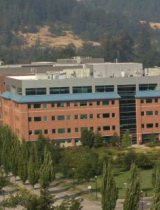Breast Care
The expert team of nurses, radiologists and breast surgical oncologists at PeaceHealth can screen, diagnose and monitor a range of benign (noncancerous) breast conditions. Most breast lumps are harmless. However, there are some, such as complex cysts, that may have a higher risk of causing breast cancer.
If you are diagnosed with breast cancer, you can receive advanced breast cancer care close to home at PeaceHealth.
Breast care at PeaceHealth
Find breast care services that are comprehensive and close to home.
Accredited breast imaging center
PeaceHealth has been named a Breast Imaging Center of Excellence by the American College of Radiology. This means we've met or exceeded high standards for imaging quality and safety and you can expect care and procedures from us that enhance outcomes.
You’ll have a nurse navigator to guide you
Learning you have breast cancer can feel overwhelming, but you don’t have to face it alone. Your dedicated PeaceHealth nurse navigator will guide you at every step throughout your treatment and recovery.
Access to free screenings
Lack of insurance shouldn’t keep you from having a mammogram that could help save your life. Through our partnerships with local nonprofits, patients that qualify can get free breast exams.
A wide support network
Educational and support services can help you cope with a cancer diagnosis and treatments. Resources include cancer rehabilitation, support groups, nutrition services, palliative care and financial counseling. We also offer an on-site boutique where you can find prosthetic breasts, wigs and scarves.
All Breast Care Locations


Friday Harbor, WA 98250

Florence, OR 97439

Bellingham, WA 98225

